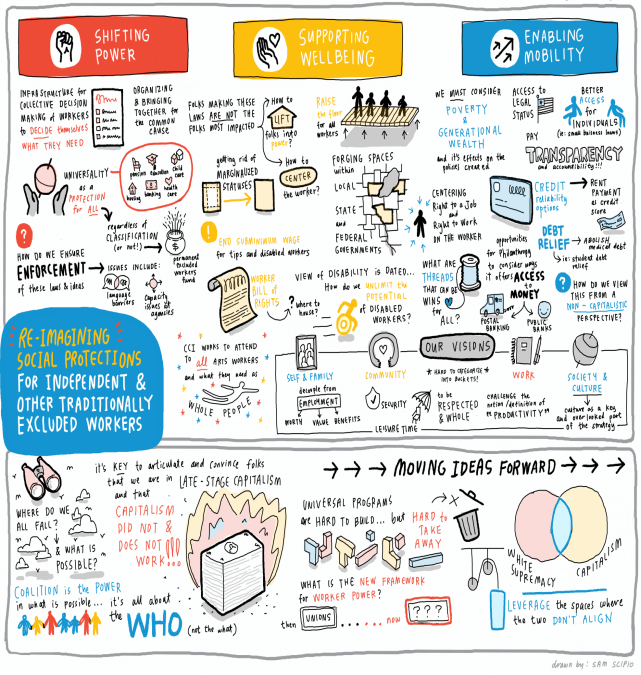June 2, 2023 / Building Bridges
Imagining Social Protections for All
Bringing together worker advocates and movement leaders to imagine new systems of protection
Althea Erickson
Althea Erickson is the Director of the Sol Center for Liberated Work, a program of the Center for Cultural Innovation. Previously, Althea was the Vice President of Global Government Affairs and Impact at Etsy, and Advocacy & Policy Director at Freelancers Union.
Sometimes when we’re living inside a system, it’s hard to imagine what an alternative could look like.
In our desire to make progress–to improve the way things work–we focus on a tweak here, a shift in implementation there. And to some extent, that can be a good and pragmatic strategy. But it has its downsides.
When we seek to fix the systems we live in, we may unintentionally reinforce and entrench ones that simply don’t work, and worse, undermine our hope of achieving more. For example, the U.S. social safety net excludes huge swaths of workers–domestic workers, farm workers, self-employed workers, sex workers, and undocumented workers, just to name a few. Some of these groups were explicitly excluded to appease Southern segregationists, while others were merely overlooked due to the nature of the economy at the time. To date, much of the effort to close those gaps has been to focused on expanding existing systems to new populations, for example including domestic workers in labor laws or excluded workers in unemployment insurance. But what if the 21st century work force simply doesn’t fit into 20th century systems?
What if we started fresh, and reimagined a set of social and economic protections that met the needs of today’s workforce, unencumbered by the past? And what if we started that conversation with the workers who have been erased from the conversation, yet are most excluded from today’s safety net? What types of protections might we imagine together? And wouldn’t that system be more likely to actually work for all?
Those questions underpinned Reimagining Social Protections for Independent and Other Traditionally Excluded Workers, a convening we co-hosted with the Urban Institute in December 2022. The convening brought together worker advocates representing nontraditional workers from across a wide swath of sectors–domestic workers, migrant workers, temp workers, street vendors, migrant workers, sex workers, and more. Together, we set aside the constraints of today’s systems, and gave ourselves permission to imagine an alternative vision of economic security for today’s workforce, to dream beyond barriers of all kinds.

The ideas that garnered widespread support were pretty inspiring, and start to paint the picture, and the true possibility, of an alternative system of protections that isn’t contingent on your specific job or identity as a worker, but is guaranteed to you, as a human. In particular, attendees imagined:
- Widespread adoption of guaranteed income and other cash transfer programs that offer a floor of protections for all workers regardless of employment status
- Improvement of key social insurance programs, including healthcare, unemployment insurance, and retirement to make them affordable, portable, and universally available to everyone, regardless of their employment status
- The establishment of a national worker bill of rights that would apply to all workers, regardless of sector, occupation, or employment status
- Robust enforcement of labor laws and worker protections across all sectors
- Exploration of new models for building and wielding collective power, like sectoral bargaining
Driving the discussion were some core ideas – and really cultural and narrative shifts – that we, as a society, need to grapple with.
- We need to decouple work from worth.
- All people deserve dignity.
- We are full humans deserving support, not just in the narrow confines of our identities as workers.
- Our labor is more than the labor we do to earn income. It is the labor we do to support our families, to strengthen our communities, and to express ourselves that makes life worth living.
- A just society recognizes the value of people as humans, and builds systems to support broader human flourishing.
As inspiring as the visioning was, at times participants raised the challenges that stand in the way of moving from the systems we have to the systems we want, especially given the current political forces shaping policy today. And yet, there was palpable energy in the room around building greater connectivity and connection across these groups, to build greater collective power between and among nontraditional workers across sectors.
Yes, the challenges are great, but if we can align ourselves around a shared vision, we can start to build bridges to get from here to there.
You can read the full summary of the convening here. We, of course, welcome your voice in this ongoing conversation.


